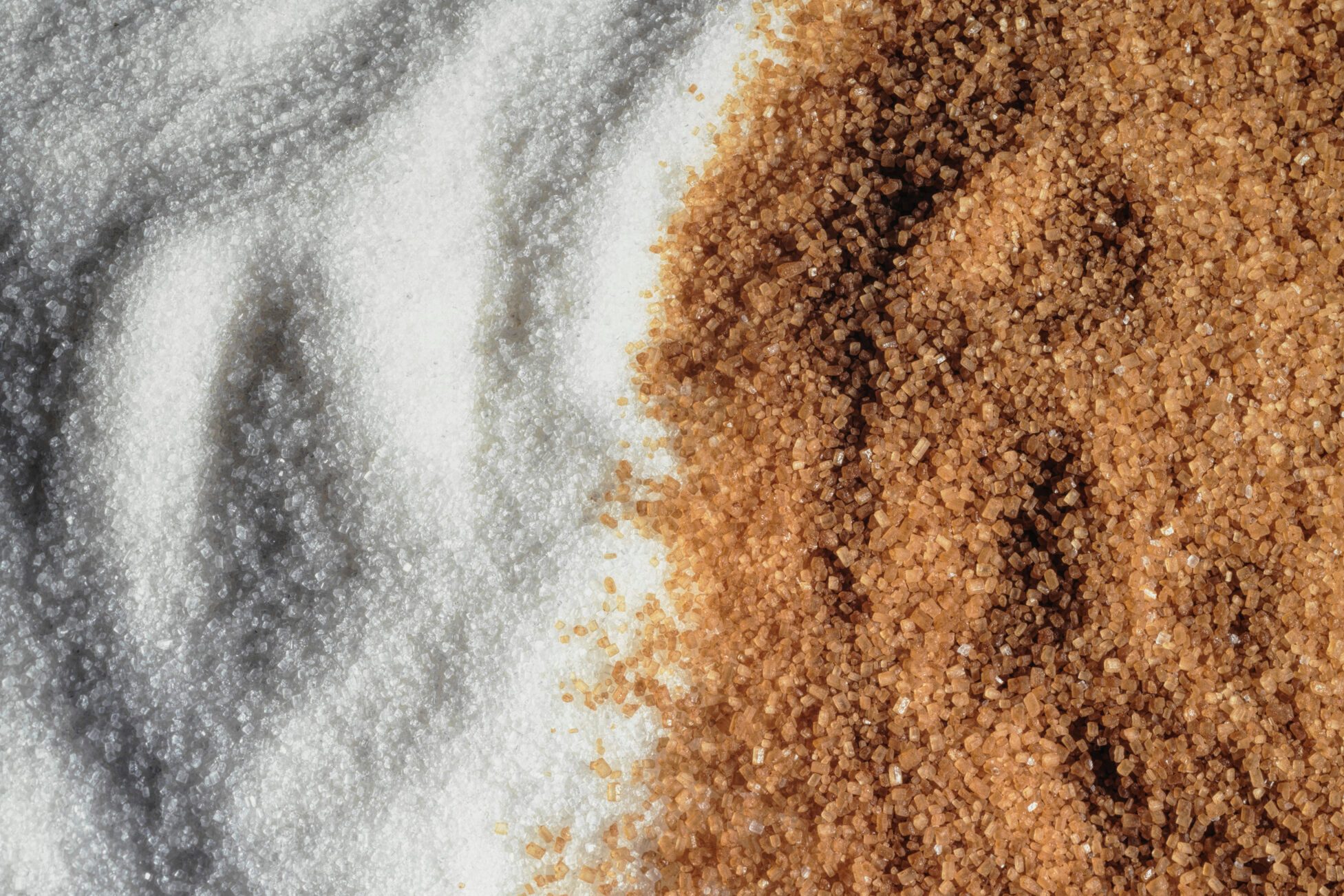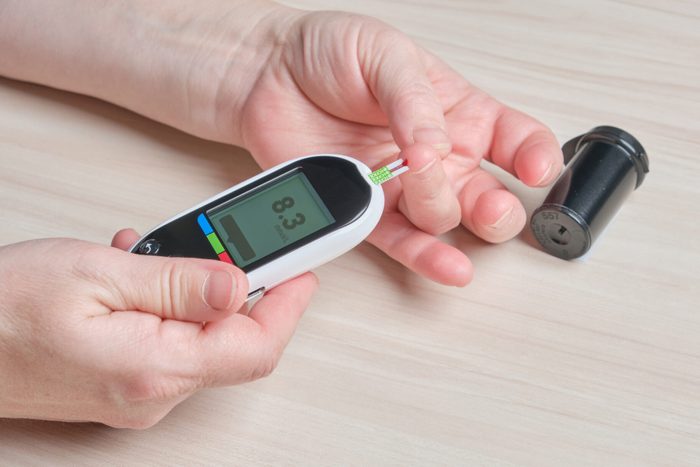Health experts reveal the surprising changes your body goes through when you quit sugar—like clearer skin, weight loss, and more energy.

9 Things That Happen to Your Body When You Stop Eating Sugar

About the experts
|
Highlights
|
If you start your day grabbing a powdered doughnut and extra-sweet coffee from your local cafe, your daily sugar intake could be high. But most of us eat too much sugar, according to the American Heart Association (AHA). The average American reportedly consumes 17 teaspoons of added sugar daily—more than two to three times the recommended limit.
So, what should we be aiming for? According to the AHA:
- Men should limit sugar intake to 9 teaspoons or less (36 grams or 150 calories).
- Women should limit sugar intake to 6 teaspoons or less (25 grams or 100 calories).
One reason we tend to reach for something sweet is that sugar stimulates the release of dopamine—a hormone that drives pleasure and makes us feel good, explains Katy Willbur, MS, RD, LDN, Clinical Dietitian at the Frances Stern Nutrition Center at Tufts Medical Center. Sugar also provides a quick energy boost.
“Unfortunately, with sugar, there can be too much of a good thing,” she says. “Excessive refined sugar intake can have negative effects on our heart, increase our blood glucose levels, and cause inflammation within the body.”
That doesn’t mean you cannot have sugar at all. The AHA points out that sugar naturally occurs in foods like fruit and dairy, both of which have a range of nutritional benefits. The challenge lies within the refined sugars that are added to many of our foods and beverages. “We often consume [sugar] without even knowing,” Willbur says.
While reducing your sugar intake can lead to better long-term health outcomes, we asked health experts what noticeable changes can occur within days, weeks, or months after you stop eating sugar.

1. You may look younger
Sugar equals wrinkles, says Anthony Youn, MD, FACS, a plastic surgeon in Troy, Michigan, and author of The Age Fix: A Leading Plastic Surgeon Reveals How to Really Look Ten Years Younger. “Sugar causes glycation, a process by which the sugar molecules bind to and deform the collagen and elastin in our skin,” Dr. Youn says. Collagen and elastin are the two main proteins that give our skin its youthful, supple properties, so we want to preserve them as much as possible.
“Giving up (or reducing) the amount of sugar you eat can also reduce glucose and insulin spikes in your bloodstream, reducing chronic and acute inflammation linked to aging,” he adds. According to Dr. Youn, you can get your glow on within 14 days of giving up sugar.
And to keep that skin shining, 2025 research published in Food Science & Nutrition found that while sugar accelerates skin aging, foods rich in antioxidants, like whole fruits and vegetables, slow down the process.

2. You may feel happier
“You might think eating a cookie will make you happy, but sugar consumption has actually been linked to higher rates of depression,” says Megan Gilmore, CNC, a certified nutritionist consultant in Kansas City, Kansas, and author of No Excuses Detox: 100 Recipes to Help You Eat Healthy Every Day. “This may be due to the fact that sugar can lead to chronic inflammation, which impacts brain function.”
Research published in BMC Psychiatry in 2024 says that in addition to effects on brain function—such as interfering with neurotransmitters that regulate your mood—a high-sugar diet may alter the gut microbiome. This balance of gut bacteria plays a role in many nervous system activities, including regulating your mental health and stress response.
The study, which analyzed dietary habits and mental health of over 18,000 U.S. adults, also found that 100 grams (around 25 teaspoons) per day increase in dietary sugar is associated with a 28% greater prevalence of depression. That’s after controlling for a range of other factors that can relate to mental health, such as chronic disease, education level, marital status, income level, physical activity, and more.
Given that strong association, when you cut out sugar, you might feel that fog lift along with your mood—and likely in just one to two weeks, Gilmore says.
Reducing added sugar in your diet also helps you dodge blood sugar spikes and dips, which can keep your moods in check, adds Leah Kaufman, MS, RD, CDE, CDN, a registered dietitian at NYU Langone’s Weight Management Center. “Think about a kid on Halloween. After they eat all that sugary candy, they get a sugar high, and then they crash,” she says. This is what happens when adults eat sugar, too.

3. You may shed pounds
“Sugar can be addicting, and when we decrease the amount that we eat, it also stops cravings, so we consume fewer calories and lose weight,” Kaufman says.
In addition, Gilmore says, “When you eat refined sugar, your body may not get the signal that you’re full, causing you to consume too many calories and gain weight.” She adds, “When you replace sugar with nourishing whole foods, your hormones will naturally regulate, sending signals to the brain when you’ve eaten enough.”
In fact, 2024 research published in Nutrition, Metabolism and Cardiovascular Diseases confirmed a link between added sugar intake, weight gain, and risk of obesity.
The study followed thousands of people’s dietary and health patterns over a 30-year period and found:
- Weight gain association: People who ate less than 50 grams of added sugar (10% of daily calories, still higher than the current AHA recommendation) weighed 10 pounds less on average.
- Waist size association: People with higher added sugar consumption had a 2.2 centimeter (0.87 inch) greater increase in waist size.
By swapping out added sugar, you’ll lose weight without trying so hard—often within the first week, Kaufman says.

4. You may catch fewer colds
Sugar contributes to chronic inflammation, which lowers our immune system’s ability to fight off colds and flu, Gilmore says. (Chronic inflammation is also associated with the development of many diseases.)
Still, a 2023 review of research published in Diabetology shows how sugar’s impact on our immune system goes beyond inflammation. The researchers found that high sugar intake can actually impair our immune system cell function, leaving our bodies more vulnerable to viruses, infections, and more.
Other 2023 research published in Frontiers in Allergy suggests that sugar overconsumption can lead to allergy development or, if you already have allergies, worsened allergy symptoms. Again, this is due to how sugar affects our immune system and promotes inflammation.
So, what happens to your body when you stop eating sugar? “You’re likely to have fewer sniffles year-round, and it may also help to reduce your allergy and asthma symptoms, too,” Gilmore says.

5. You’ll lower your type 2 diabetes risk
Quitting sugar gives your body’s natural detox systems a chance to do their job—and that small change can make a huge difference.
A 2025 research review from Advances in Nutrition shows that for each serving of a sugary drink like soda per week, your risk of type 2 diabetes goes up by 4%. Meanwhile, 2020 research published in The American Journal of Nutrition found that eating a diet low in sugar (while increasing intake of vegetables, fruits, whole grains, and lean protein) can lower your risk of type 2 diabetes by a whopping 40%.
This is because without excess sugar interrupting normal bodily processes, your system starts flowing smoother. “In the first couple of hours without sugar, your pancreas will start to produce less insulin and your liver will also start to catch up on processing stored toxins,” explains Marc Alabanza, a certified nutritional therapist with 14 years of experience in the wellness and fitness industry.
This process will take a little longer if you are already insulin resistant (a pre-diabetes state in which your body produces the hormone insulin, but doesn’t use it properly), he adds. “The time for most of these symptoms to completely subside can run up to five weeks, at which point one will no longer be a slave to refined sugar.”

6. You may live longer
“When glucose spikes after eating sugary food, our insulin increases to compensate for it, and this activates a part of our nervous system which increases blood pressure and heart rate,” Kaufman says.
High blood pressure is a major risk factor for heart disease, as is type 2 diabetes and obesity, both of which have been linked to excessive sugar consumption. Sugar also increases unhealthy fats called triglycerides in the blood, which increase the risk for stroke and heart disease—the leading cause of early death in the U.S.
Still, 2024 research published in JAMA Open Network found that excess sugar actually ages us all the way down to the cellular level. The study found a link between low-sugar diets and slower biological aging body-wide.
In fact, another study, published in 2023 in Nature Food, suggests that life expectancy goes up by 10 years for people who eat diets low in sugar and high in foods like whole grains, nuts, and fruits.

7. You’ll improve your breath and your smile
Your sweet tooth is really anything but when it comes to the health of your smile, says Saul Pressner, DMD, FAGD, a dentist in New York City. “Sugar is a major cofactor in causing cavities as it interacts with bacteria in your mouth to form the acid that causes decay,” he says.
Research published in BDJ Open in 2024 says sugar is also a key player in gum disease, or periodontitis. Gum disease is a leading cause of tooth loss, can cause gum recession or loose teeth, and in more severe cases, infections. There’s also a link between periodontitis and conditions like heart disease, stroke, and diabetes, according to the Cleveland Clinic.
By quitting sugar, you start supporting better oral health on day one. Your breath will also improve, as sugar feeds the bacteria that cause bad breath. These benefits will be immediate, and will only get better with time, Dr. Pressner says.

8. You may have better sex
“For men, eating sugar causes an insulin spike that drives pathways that reduce sex drive and function,” explains Mark Hyman, MD, founder of Cleveland Clinic’s Center for Functional Medicine in Ohio and the founder and director of the UltraWellness Center in Lenox, Massachusetts.
Sugar also wreaks havoc on female sex hormones, says Dr. Hyman, the author of several books, including the 10-Day Detox Diet. This affects more than just sex life and desire, he adds. “It can cause women to lose hair on their head, and grow it on their faces as well as develop acne and irregular periods.” Reversing these effects are among the benefits of cutting out sugar.

9. You may sleep like a baby
If it’s loaded in sugar, your midnight snack may rob you of the ability to get a good night’s sleep, Dr. Hyman says.
“People can develop low blood sugar and get night sweats if they have a sugary snack before bed,” he says. “Eating sugar before bed can also supercharge stress hormones, which leads to trouble sleeping.”
It’s not just pre-bedtime sweets that can throw off your sleep, either. Research published in Frontiers in Nutrition in 2024 shows that if you eat too much sugar in your diet in general, you’re more likely to develop poor sleep patterns, abnormal sleep duration, snoring, and daytime sleepiness.
What happens when you stop eating sugar? “You will get higher quality z’s within two or three days of kicking the sugar habit,” Dr. Hyman says.

Stay the course
It’s not necessarily easy to give up sugar, according to New Zealand-based doctor Sharad Paul, MD, author of The Genetics of Health: Understand Your Genes for Better Health.
“Sugar is addictive and triggers withdrawal symptoms if we stop eating it,” he says. “Mood changes like anxiety and anger usually last for about two weeks, but up to a month if you have been eating a lot of sugar over a long period of time.”
“Even artificial sweeteners like aspartame cause withdrawal effects, so it’s best not to use them as a means to reduce sugar intake,” he says.
Alabanza adds that headaches and flu-like symptoms may also occur, and you can reduce them with exercise: “A moderate to brisk paced walk or hike can help by slightly increasing circulation and metabolism, boosting the immune system, and giving the person something positive to focus on.”
Tips for cutting sugar out of your diet
“Gradually reducing refined sugar intake is usually the easiest and most sustainable way to remove refined sugars from your diet,” Willbur says.
First, take a look at what you’re drinking. According to the AHA, sugar-sweetened beverages make up 24% of the added sugars we consume on average. For example, a 12-ounce can of soda alone contains 10 teaspoons—or 42 grams—of added sugar, almost double the recommended limit for women and more than the limit for men.
Willbur suggests starting with small swaps, such as:
- Seltzer water instead of soda
- Water with lemon or mint instead of juice
- Unsweetened iced tea instead of sugary versions
- Reducing the amount of sugar, honey, or syrups in your morning coffee or tea
“While you’re focusing on changing your beverages, look at other meals or foods in your diet that contain refined sugars.” Willbur says to consider:
- Swapping your sweet cereal bar for dried nuts or unsweetened trail mix
- Replacing a daily dessert with fresh fruit
- Adding sliced almonds, fruit, or another topping to your yogurt instead of buying a flavored (and therefore artificially sweetened) yogurt
“Find small things in your diet to modify and gradually make these changes,” Willbur advises. “It’s usually much easier and less overwhelming than changing everything at once.”
A timeline of what happens when you stop eating sugar
Sugar tastes good, it makes us feel good when we eat it (thanks to the dopamine release), and it gives us a quick energy boost since the body can easily use it as fuel.
“Over time, as we consume more refined sugars, our body becomes accustomed to this regular intake and craves that same amount each day,” Willbur explains. This cycle can lead to cravings—and like breaking any other craving, stopping sugar can have side effects.
Week 1 after quitting sugar
The first few days after quitting sugar are typically when any adverse symptoms peak. But it really depends on how much sugar you were consuming in the first place, Willbur explains.
Generally, she says that the most common “withdrawal” symptoms from curbing a high-sugar diet include:
- Headaches
- Fatigue
- Cravings for sweet foods
According to a 2022 review of research published in Obesity Reviews, you might experience a bit of moodiness when you first stop eating sugar. After all, the brain’s reward centers that trigger that dopamine boost aren’t being constantly activated by sugar.
However, the research supports Dr. Willbur’s advice: Gradually decreasing your sugar intake can limit symptoms—as can replacing sugar-loaded items with something equally desirable, just with less sugar. Notably, the study authors also say that if you expect to have a negative experience, symptoms are more likely to occur.
But on the bright side, here’s what else happens right after you stop eating sugar:
- You’ll have better breath almost immediately.
- Within 2 to 3 days, your sleep starts improving.
- Within the first week, you may start seeing noticeable weight loss.
Weeks 2 to 4 after quitting sugar
Depending on how much sugar you were eating—and how drastic your cutback is—negative effects can persist, though less severely, for up to 30 days, Willbur says.
However, during that period, you will also see positive changes occur.
“Your energy levels will likely be more stable throughout the day, you will notice fruits and other naturally sweet foods are more flavorful, and your cravings should substantially decrease,” she says. “And you should feel less obligated to eat that daily sweet treat and more empowered to choose another delicious food that shouldn’t cause an energy crash later.”
What’s more, within the month after you’ve stopped quitting sugar:
- Your skin health and appearance will improve.
- You may notice your mood lifting.
- Your oral health can start improving.
Months (and years) after quitting sugar
Sugar has far-reaching effects throughout our body. In excess, it interferes with our immune system, promotes chronic inflammation, can disrupt gut health, trigger allergic responses, interrupt hormone function, and more.
By keeping your added sugar intake low, you can reduce the risk of many long-term health issues. “Reducing refined sugar intake can help lower blood [sugar] and triglyceride levels, lower risk for heart disease, stroke, and some cancers,” Willbur says.
In addition:
- With your immune system at full strength, you’re more likely to fend off seasonal colds, the flu, and other infections.
- Reducing the chronic inflammation associated with high sugar consumption can ease allergy and asthma symptoms.
- You’re at less risk of developing oral health problems, like dental cavities and tooth decay.
- Hormones—including mood-regulating neurotransmitters, estrogen, testosterone, and insulin—should bounce back to normal levels.
For daily wellness updates, subscribe to The Healthy by Reader’s Digest newsletter and follow The Healthy on Facebook and Instagram. Keep reading:






















